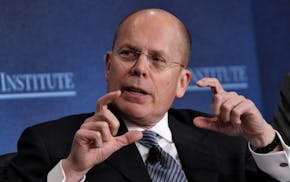If the federal government isn't going to aggressively promote the public health value of vaccines, then the University of Minnesota will spearhead a privately financed venture to do the job instead.
The U's Michael Osterholm on Thursday unveiled the Vaccine Integrity Project, which will explore how to use nongovernmental organizations to boost public confidence in vaccines and counter misinformation, even when it comes directly from President Donald Trump's administration.
"If a lot of misinformation comes out, who is commenting on it? Who is pushing back?" said Osterholm, director of the U's Center for Infectious Disease Research and Policy, often known by the acronym CIDRAP.
The project is funded by iAlumbra, a foundation established by Christy Walton, an heir by marriage to the family that founded Walmart. Walton has supported CIDRAP in the past. Co-leaders of the project include Dr. Margaret Hamburg, a former commissioner of the Food and Drug Administration, and Dr. Harvey Fineberg, a past president of the National Academy of Medicine.
"The stakes are too high for us to sit back and watch," they said in a joint statement. "We cannot allow vaccine preventable conditions, such as measles and whooping cough, to become regularly occurring outbreaks here in the U.S. again."
Among a growing number of Americans' confidence in vaccines has withered — a trend accelerated by concerns over the COVID-19 shots and how they were promoted and mandated during the pandemic. Concerns have since spread to other vaccines, spurred in part by false claims by Trump and his health secretary, Robert F. Kennedy Jr.
Only 86% of Minnesota kids were vaccinated against measles in time for kindergarten in 2023, the sixth-worst rate among states and a decline from 94% a decade earlier.
The highly infectious disease appears to be exploiting cracks in the nation's vaccine shield. More than 800 measles infections have been reported in the country this year. Two cases have been reported among Minnesotans in 2025, though one involved an infant too young to be vaccinated who was exposed to the virus in another country.
The state also had an outbreak of 70 infections last year, largely among children in an East African community which has harbored fears about a link between measles vaccines and autism. Scientists have long said no such link exists.
Osterholm said vaccine confidence is at risk of eroding even more, given the mixed messaging from Trump's administration and Kennedy, who has long promoted the vaccine-autism link despite substantial research disproving any such connection.
A first goal for the integrity project this summer is to create a coordinated national strategy where the scientific community can effectively respond to misinformation about the safety and effectiveness of vaccines, Osterholm said.
"You can't wait to try to pull things together" if misinformation spreads during an outbreak of infectious disease, he said. "You've got to be prepared."
Although Trump's first administration engineered Operation Warp Speed to spur development of COVID-19 vaccines in record time, his advocacy for vaccination overall has been uneven. He did not publicly encourage citizens to get vaccinated for COVID while he was in office, even though he was hospitalized after contracting it and later quietly got vaccinated himself. When he admitted in December 2021 that he got his COVID booster shot, he was booed by a crowd in Dallas.
In his second term, he nominated a prominent vaccine skeptic to the nation's top public health job, and many of his administration's budget-cutting efforts to save money for tax relief have undercut vaccine research and public vaccination clinics and campaigns.
The HealthPartners Institute in Bloomington, for example, lost a $750,000 federal grant to study whether dentists could increase HPV vaccinations. A U researcher lost more than half of his $187,000 grant to study vaccine hesitancy among people with mental illnesses who are more prone to severe illnesses and deaths from vaccine-preventable causes.
The federal government also halted $220 million in federal grants to the Minnesota Department of Health, arguing that they were intended to confront COVID and are not necessary now because the infectious disease is no longer classified as a public health emergency.
The state initially responded by issuing layoff notices to 170 workers, including epidemiologists and public health workers who led vaccination campaigns. However, the department suspended most of those layoffs after reviewing how the federal grants were tied to some jobs but not others. A Health Department spokesman on Thursday said the new total is about 100 layoffs.
Osterholm said the new integrity project takes on added importance, considering the loss of public health voices at the state level.
It also could take on some of the work of the federal Advisory Committee on Immunization Practices, which historically advised doctors on which vaccines to give to Americans, and when. The Trump administration canceled the first ACIP meeting this year and may reduce its role.

UnitedHealth sues the Guardian, alleging defamation in coverage of nursing home care

Prices for international flights drop as major airlines navigate choppy economic climate
Minnesota's med spa industry rises in popularity — and with little regulation

Hundreds line up at Best Buy to nab Nintendo Switch 2, in scene like '90s opening parties

